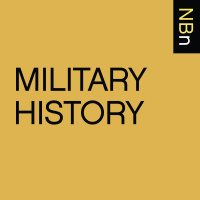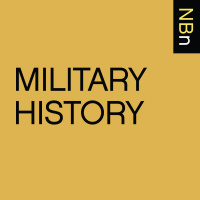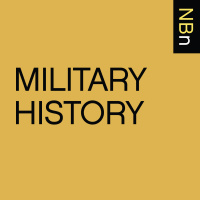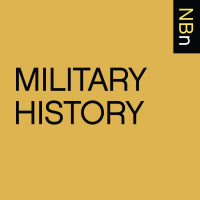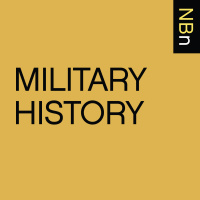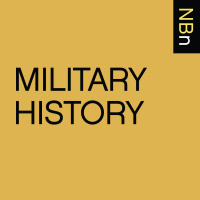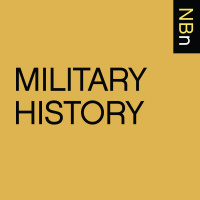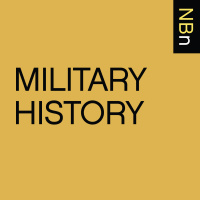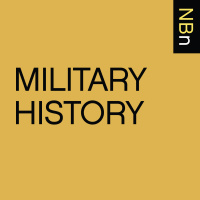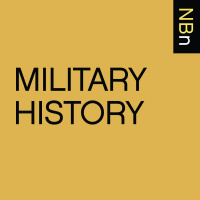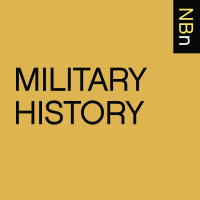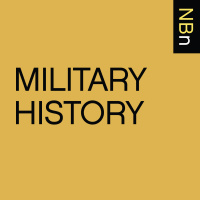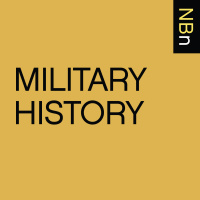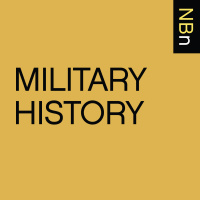Sinopsis
Interviews with Scholars of Military History about their New Books
Episodios
-
David Curtis Skaggs, “William Henry Harrison and the Conquest of the Ohio Country: Frontier Fighting in the War of 1812” (JHU Press, 2014)
14/02/2017 Duración: 57minThough best remembered today for his brief tenure as the ninth president of the United States, William Henry Harrison’s most significant contribution to American history was his service as a general in the War of 1812. In William Henry Harrison and the Conquest of the Ohio Country: Frontier Fighting in the War of 1812 (Johns Hopkins University Press, 2014), David Curtis Skaggs recounts Harrison’s military career and the lessons he learned that brought him national acclaim. The son of a Virginia aristocrat, Harrison rejected a medical career in favor of service in the United States Army. While serving as an aide to General Anthony Wayne in the 1790s, he learned the challenges of campaigning in what was then the northwestern frontier of the United States. These lessons stood him in good stead later when, as governor of Indiana Territory, he faced the growing challenge of Tecumseh’s confederacy, the defeat of which became his claim to fame. Yet as Skaggs demonstrates it was his subsequent victo
-
Paul Pedisich, “Congress Buys a Navy: Politics, Economics, and the Rise of American Naval Power, 1881-1921” (Naval Institute Press, 2016)
30/01/2017 Duración: 01h12minIn the forty years between 1881 and 1921, the United States Navy went from a small force focused on coastal defense to one of the world’s largest fleets. In Congress Buys a Navy: Politics, Economics, and the Rise of American Naval Power, 1881-1921 (Naval Institute Press, 2016), Paul Pedisich describes the role that the legislative branch played in making this happen. At the start of the period, the Navy possessed a more decentralized organization than today, with the bureau chiefs who ran it more responsive to Congress than the executive branch. The legislators who played critical roles in shaping policy during this period were often driven more by local concerns than any overarching vision of what the Navy should become. Starting in the 1880s, however, successive presidential administrations gradually persuaded Congress to provide more funding to build modern ships. Over time, America’s growing engagement in global affairs led to the expansion of the navy, as the acquisition of an overseas empire
-
Ellen Eisenberg, “The First to Cry Down Injustice?: Western Jews and Japanese Removal during WWII” (Lexington Books, 2008)
27/01/2017 Duración: 01h20minThe mass incarceration of Japanese Americans in the Pacific West is one of the most shameful episodes in our nation’s history. As the United States waged war against fascism, it removed tens of thousands of American citizens and their families from their homes. The First to Cry Down Injustice?: Western Jews and Japanese Removal during WWII (Lexington Books, 2008) invites us into a community in the middle of that contradiction. American Jews knew too well the dangers of prejudice but remained firmly committed to the fight against Nazism, at any cost. Professor Ellen Eisenberg invites us into the complexity of Jewish response to Japanese incarceration. In doing so, she parses the tense and near universal silence that Jewish institutions kept as their Japanese neighbor disappeared. This silence, she proposes, reflected not indifference but a struggle to reconcile opposition to bigotry with an unwillingness to risk speaking out. But she also tells other stories at the margins of that silence. Jewish civic l
-
Tim Brady, “His Father’s Son: The Life of General Ted Roosevelt, Jr.” (NAL, 2017)
19/01/2017 Duración: 01h15minTim Brady’s book His Father’s Son: The Life of General Ted Roosevelt, Jr. (NAL, 2017) is not just the biography of the eldest son and namesake of America’s 26th president, but an account of a life that was adventurous and consequential in its own right. Coming of age in the years in which his Theodore Roosevelt served as president, Ted at times struggled to measure up to the daunting example set by his dynamic father. While often emulating his father’s path, Ted nonetheless sought to be judged on his own achievements, and distinguished himself in both business and in command during the First World War. To many Ted was on his way to becoming the second Roosevelt to occupy the White House, yet his electoral career came to a premature end in 1924 with his loss to Al Smith in the race for the governorship of New York a loss which paved the way for his subsequent political eclipse by his distant cousin, Franklin. Yet as Brady demonstrates, the growing animosity between the two branches of t
-
Timothy S. Huebner, “Liberty and Union: The Civil War Era and American Constitutionalism” (U. Press of Kansas, 2016)
19/12/2016 Duración: 01h10minTimothy S. Huebner, the Irma O. Sternberg Professor of History at Rhodes College in Memphis, has written Liberty & Union: The Civil War Era and American Constitutionalism (University Press of Kansas, 2016), a one-volume history of the constitutional debates regarding slavery and sovereignty from the Declaration of Independence through the end of Reconstruction. Huebner brings together three strands of history: African American history, military history, and constitutional/political history. In doing so, he joins often disparate areas of inquiry in an account of the unresolved questions from the Founding Era: 1) what would become of slavery? and 2) what was the nature of the Union and how was sovereignty divided between the states and federal government? Huebner reviews the competing theories and political events that repeatedly stoked debate and conflict over how slavery would be handled in a federated constitutional republic. Huebner makes original contributions to the debates about the Civil Wars origin
-
Jane Eppinga, “Henry Ossian Flipper: West Point’s First Black Graduate” (Wild Horse Press, 2015)
09/12/2016 Duración: 36minThe remarkable story of Henry Ossian Flipper, a young man born into slavery on the eve of the Civil War, and his struggle for recognition left its mark on our nations history. Through extensive research of military documents, court records, appeals, and from Flippers personal journals and published papers, Henry Ossian Flipper: West Point’s First Black Graduate (Wild Horse Press, 2015) captures the sum and substance of a nation torn apart by political ambitions and extreme prejudices and reveals the uncertainty of acceptance and intolerance of blacks in America following Lincoln’s 1863 Emancipation Proclamation. In 1878, Flipper seemed destined for a long military career. Four years later, he was on trial at Fort Davis, Texas, for embezzlement of government funds and conduct unbecoming an officer and a gentleman. But his journey through the West did not end in West Texas, it was only the beginning. Before Flipper’s life was over his adventures would take him through Mexico, South America, an
-
Larrie Ferreiro, “Brothers at Arms: Independence and the Men of France and Spain Who Saved It” (Knopf, 2016)
02/12/2016 Duración: 01h03minWas the War for American Independence really about American independence? It depends on who you ask. In his new book, Brothers at Arms: American Independence and the Men of France and Spain Who Saved It (Knopf, 2016), Larrie Ferreiro draws on decades of new research in archives and on battlefields across the US and Europe to detail the smuggling, espionage, gun running, and politicking that wrested the United States from British control. A revision of the national myth that the American colonies rose up and threw off imperial oversight solely by the unity found in the strength of their convictions, this globalist return to the 1760s and 70s weaves together military, economic, diplomatic, and social history with fascinating stories of the European soldiers, sailors, merchants, and ministers who conspired and collaborated to give the north American colonies a fighting chance. In Brothers at Arms, and in this interview, Dr. Ferreiro advances the argument that for the governments of France and Spain, defeating th
-
Marc R. Blackburn, “Interpreting American Military History at Museums and Historical Sites,” (Rowman and Littlefield, 2016)
28/11/2016 Duración: 01h06minOur guest for this interview combines his academic expertise in American military history with his professional experience as an employee of the National Park Service. Marc Blackburn is the author of Interpreting American Military History at Museums and Historical Sites (Rowman and Littlefield, 2016). An expert in the interpretation and presentation of historical narratives and themes through material artifacts, archives, and exhibit space, Marc offers both a fresh perspective blending public and academic history in his book. Offering a series of observations on the state of public history in the United States, he also provides a short yet comprehensive chronological narrative of the nation’s military past. Like myself, a former student of Russell F. Weigley, Marc provides a refreshing conversation about the current and future states of the craft. One disclaimer: the thoughts that Marc Blackburn expresses in this interview and in his book are his own, and in no way reflect the policies or opinions of th
-
Jelena Batinic, “Women and Yugoslav Partisans: A History of World War II Resistance” (Cambridge UP, 2015)
01/11/2016 Duración: 56minJelena Batinic’s Women and Yugoslav Partisans: A History of World War II Resistance (Cambridge University Press, 2015) examines the role women played in the Communist-led Yugoslav Partisan resistance. By placing gender and gender relations at the forefront of her analysis, Batinic provides insightful history of a unique phenomenon—guerrilla warfare in which tens of thousands of women took direct military roles. Based on vast amount of archival sources, Batinic demonstrated how gender was the main organising force of the Partisan movement. In this interview, we have talked about the main arguments of the book, particularly focusing on gender relations within the movement. Additionally, the interview will also introduce our listeners to the Balkan conflict during the Second World War and explore how and why the remarkable story of the Partisan women fell into oblivion.Learn more about your ad choices. Visit megaphone.fm/adchoices
-
Robert Matzen, “Mission: Jimmy Stewart and the Fight for Europe” (GoodKnight Books, 2016)
24/10/2016 Duración: 01h06minJimmy Stewart has a well-deserved reputation as one of the major stars of the classic film era. Yet his life was greatly affected by his experiences as a bomber pilot in World War II. Robert Matzen, author of the book, Mission: Jimmy Stewart and the Fight for Europe (GoodKnight Books, 2016), reviews Stewart’s life in a military family and his role in the allied victory in Europe. He also discusses how the war affected Stewarts immediate post-war film career.Learn more about your ad choices. Visit megaphone.fm/adchoices
-
John Prados, “Storm Over Leyte: The Philippine Invasion and the Destruction of the Japanese Navy” (NAL, 2016)
13/10/2016 Duración: 54minNarratives of the Pacific War frequently examine the 1944 Battle of Leyte Gulf from the operational perspective, focusing on the desperate actions of the US Seventh Fleets escort carriers, Task Unit 77.4.3 (“Taffy 3”) against the much larger Japanese Center Force, commanded by Vice Admiral Takeo Kurita. The ensuing drama, including the famous call for help and rebuke of US Third Fleet commander, Admiral William F. Halsey, Jr., has become legend. In his latest book, Storm Over Leyte: The Philippine Invasion and the Destruction of the Japanese Navy (NAL, 2016), seasoned historian John Prados places Leyte Gulf as the denouement of a larger campaign for control of the Central Pacific Ocean, one which was the swan song of Japanese naval power. Incorporating the naval intelligence of both sides, he restores agency to the Imperial Japanese Navy as the unwitting architect of its own destruction. Drawing upon a wide range of sources, including many hitherto unseen Japanese primary documents, memoirs, and i
-
Elizabeth Reich, “Militant Visions: Black Soldiers, Internationalism, and the Transformation of American Cinema” (Rutgers UP, 2016)
10/10/2016 Duración: 34minElizabeth Reich is an assistant professor of film studies at Connecticut College in New London. Militant Visions: Black Soldiers, Internationalism, and the Transformation of American Cinema (Rutgers University Press, 2016) examines how, from the 1940s to the 1970s, the cinematic figure of the black soldier helped change the ways American moviegoers saw black men, for the first time presenting African Americans as vital and integrated members of the nation. In the process, Elizabeth Reich reveals how the image of the proud and powerful African American serviceman was crafted by an unexpected alliance of government propagandists, civil rights activists, and black filmmakers. Contextualizing the figure in a genealogy of black radicalism and internationalism, Reich shows the evolving images of black soldiers to be inherently transnational ones, shaped by the displacements of Diaspora, Third World revolutionary philosophy, and a legacy of black artistry and performance. Offering a nuanced reading of a figure that
-
James Carl Nelson, “I Will Hold: The Story of USMC Legend Clifton B. Cates, From Belleau Wood to Victory in the Great War” (NAL, 2016)
16/09/2016 Duración: 42minBest remembered as the nineteenth commandant of the U.S. Marine Corps, Clifton B. Cates began his long and distinguished military career as a second lieutenant in World War I. In I Will Hold: The Story of USMC Legend Clifton B. Cates, From Belleau Wood to Victory in the Great War (NAL, 2016), journalist and author James Carl Nelson recounts Cates’ early life and service in the war. Cates was studying to take the Tennessee bar when the United States joined the war in April 1917, an event which led Cates to set aside his studies and answer the call to service. After training in the rapidly-expanding Marine Corps, Cates was sent to France in January 1918, and within a few short months he found himself at the heart of combat at the battle of Belleau Wood. Despite being in the thick fighting, Clifton escaped serious injury, and with his unit he participated in the Soissons offensive later that summer. Nelson’s book offers a look at the war Cates fought against the Germans, one in which he demonstrated
-
Akiko Takenaka, “Yasukuni Shrine: History, Memory, and Japan’s Unending Postwar” (U. of Hawaii Press, 2015)
24/08/2016 Duración: 01h10minAkiko Takenaka’s new book looks carefully at Yasukuni Shrine as a war memorial, examining its role in waging war, honoring the dead, promoting peace, and building a modern national identity. Yasukuni Shrine: History, Memory, and Japan’s Unending Postwar (University of Hawaii Press, 2015) pays special attention to the significance of memory and spatial practice in shaping Yasukuni as belief, site, and issue. The chapters guide readers from the pre-history of Yasukuni tracing the origin of an important myth that developed around Yasukuni Shrine during the Asia-Pacific War: the idea that dying for the emperor would result in enshrinement at Yasukuni as a god through the very different uses of the space as a venue for popular entertainments and celebrations, the popularization of beliefs associated with the shrine outside of Tokyo and the nationalization of the Yasukuni myth, the practices associated with Yasukuni during total war mobilization during the Asia-Pacific War, the politics and legalities o
-
Richard L. Davis, “From Warhorses to Ploughshares: The Later Tang Reign of Emperor Mingzong” (Hong Kong UP, 2015)
17/08/2016 Duración: 01h46sRuling as he did during the Five Dynasties period of Chinese history, the emperor Mingzong (r. 926-933) has not received the same degree attention from historians as have many of his counterparts. In From Warhorses to Ploughshares: The Later Tang Reign of Emperor Mingzong (Hong Kong University Press, 2015), Richard L. Davis provides readers with the first modern biography of Mingzong. Born Miaojilie, Mingzong grew up among his fellow Shatuo Turks and rose to become a leading commander of the forces of the Tang dynasty. After taking the throne in the aftermath of a military rebellion, he managed relations with other states with success and instituted a series of economic reforms designed to encourage trade. Though the territories of the Tang prospered during this period, peace was cut short by Mingzong’s death, with his dynastic line coming to a violent end less than a decade later. Davis’ book offers a window into a dramatic era in China’s past, one in which Mingzong’s reign stood out
-
Lauren Faulkner Rossi, “Wehrmacht Priests: Catholicism and the Nazi War of Annihilation” (Harvard UP, 2015)
16/08/2016 Duración: 01h04minI teach at a Catholic university and last semester co-taught (with a theologian) a class titled The Holocaust and its Legacies. Once my students became comfortable with me, they began to pepper me with questions about the role of the Catholic church during the Holocaust. Some of these questions–about the church and antisemitism, about the role of the Pope–I was able to answer effectively. But when they started asking me about the behaviors and beliefs of the bishops and priests-the people in the church who interacted with ordinary people on an everyday basis–I was at a loss. Thanks to Lauren Faulkner Rossi’s new book Wehrmacht Priests: Catholicism and the Nazi War of Annihilation (Harvard University Press, 2015), I can now give a much more informed and thoughtful answer to these questions. While Rossi spends some time looking at the macro level, she devotes most of her book to ‘ordinary’ priests who served in the German army. Some of these men were chaplains specifically en
-
Paul M. Cobb, “The Race for Paradise: An Islamic History of the Crusades” (Oxford UP, 2014)
25/07/2016 Duración: 49minThe Crusades loom large in contemporary popular consciousness. However, our public understanding has largely been informed from a western perspective, despite the fact that there is a rich textual tradition recording its history in Muslim sources. Paul M. Cobb, Professor of Near Eastern Languages and Civilizations at the University of Pennsylvania, remedies this problem in The Race for Paradise: An Islamic History of the Crusades (Oxford University Press, 2014) by presenting the fullest and most readable account of the Crusades relying on Islamic sources. Cobb expands the geographical and chronological boundaries of the Crusades by placing traditional conflicts within Muslim accounts of Frankish aggression. In general, medieval Muslims were not overly concerned with Europe and ongoing relationships between Christians and Muslims only really existed in the Mediterranean context. European expansion into Muslim lands throughout the Middle Ages marked a different phase of encounter,but these incursions were not a
-
Mitchell Yockelson, “Forty-Seven Days: How Pershing’s Warriors Came of Age to Defeat the German Army in WWI” (NAL Caliber, 2016)
25/07/2016 Duración: 58minIn Forty-Seven Days: How Pershing’s Warriors Came of Age to Defeat the German Army in World War I (NAL Caliber, 2016), National Archives historian and forensic archivist Mitchell Yockelson reappraises the American Expeditionary Force’s performance under the command of General John J. Pershing. Accordingly, the American forces’ combat experience in the September to November 1918 Meuse-Argonne Campaign is shown to be far more pivotal to Allied victory than allowed for in the standard Anglo-centric literature of the conflict. Even as Pershing’s army acquired its craft in hard fighting against an increasingly implacable and desperate German opponent, the men of the A.E.F. proved to be relentless in their efforts to clear the densely wooded and fortified forest that had resisted French efforts for the previous four years. Yockelson’s account of the campaign is even-handed and well-written, providing the foundation for an interesting conversation about the book and his own approach to
-
John Freed, “Frederick Barbarossa: The Prince and the Myth” (Yale UP, 2016)
15/07/2016 Duración: 01h09minFor all of his importance as a medieval ruler, there are surprisingly few biographies in English of the German emperor Frederick Barbarossa (c. 1122-1190). John Freed fills this gap with his new book, Frederick Barbarossa: The Prince and the Myth (Yale University Press, 2016), which offers readers both an account of Frederick’s life and his posthumous image as a German ruler. Freed begins by describing the historical background of 12th century Germany, setting Frederick’s succession to the throne within the context of medieval dynastic politics. From there he recounts Frederick’s campaigns against both the papacy and the Italian communes, his subsequent efforts to strengthen his rule in Germany, and his death in the Near East while participating in the Third Crusade. Though an undercurrent of frustrated ambition ran throughout many of his efforts, Frederick nonetheless became a symbol of a united Germany by the 19th century and, in the process, achieved a stature as a sovereign that belied t
-
Marc Lynch, “The New Arab Wars: Uprisings and Anarchy in the Middle East” (PublicAffairs, 2016)
13/06/2016 Duración: 21minMarc Lynch is the author of The New Arab Wars: Uprisings and Anarchy in the Middle East (Public Affairs, 2016). Lynch is a professor of political science at George Washington University and blogs at the Monkey Cage. From Tunisia to Egypt to Syria, the Arab Spring saw protesters storm to the street demanding reform and revolution. Five years later, most of these countries remain forever changed yet far from reformed. Peace has not been lasting across the region, and Lynch’s book attempts to reconcile what explains the ongoing warfare. He argues that this upheaval may be at its start, rather than at its completion. Authoritarian regimes remain in place in many countries and the U.S. continues to struggle to find a sustainable role.Learn more about your ad choices. Visit megaphone.fm/adchoices



